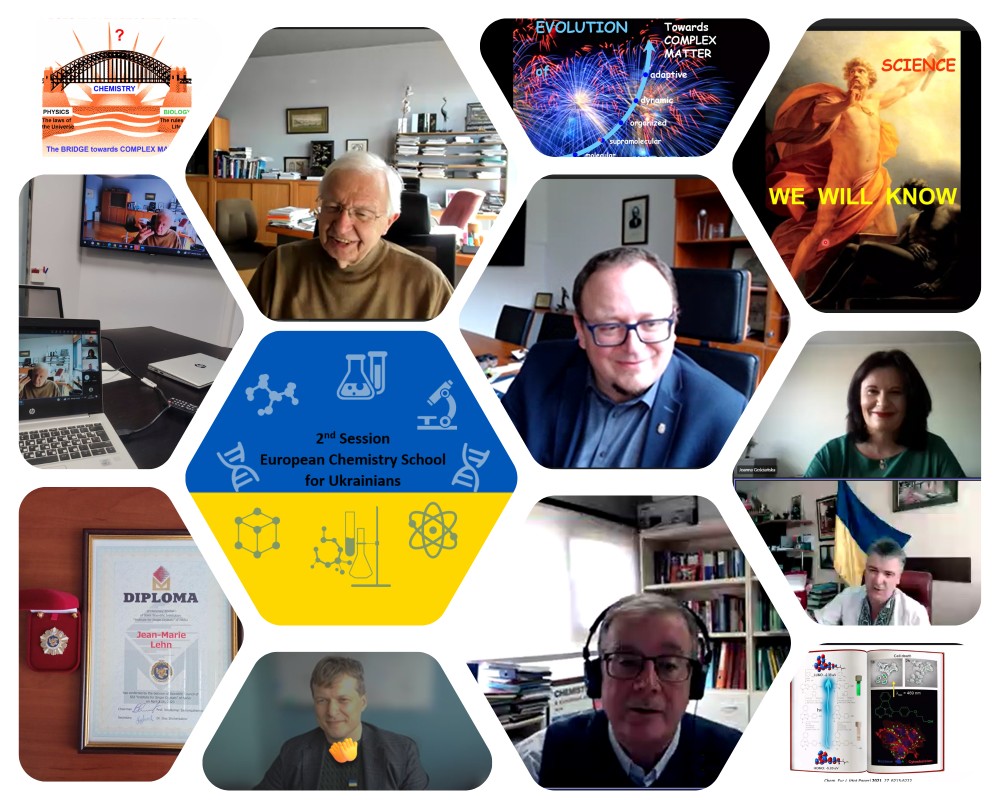European Chemistry School for Ukrainians
2nd Session May 18, 2023
The second session of the European Chemistry School for Ukrainians welcomed three more distinguished speakers: Prof. Dr. Fernando Cossío, Prof. Dr. Jean-Marie Lehn, and Prof. Dr. Wojciech Macyk.
Prof. Dr. Cossío, the Scientific Director of the Ikerbasque Foundation and Professor of Organic Chemistry at the University of the Basque Country (Spain), kicked off the meeting with an overview of his uniquely diverse research portfolio. In addition to his work on organic chemistry (performing detailed studies on the mechanisms of cycloaddition reactions and patenting anticancer pharmaceuticals), Cossío’s research team also studies particle physics. The Cossío researchers monitor double beta decay experiments, looking for observable evidence of neutrino antiparticles. This work necessitates a unique laboratory environment – an abandoned underground train tunnel, out of the reach of the cosmic radiation that disturbs their sensitive detector.
When he is not dodging cosmic rays, Prof. Cossío is busy managing the scientific interests of the Ikerbasque Foundation, an organization created to support the scientific development of researchers in the Basque Country. The Foundation currently sponsors researchers from 35 different nations working on topics ranging from bacterial toxins to ecosystem protection to the discovery of distant astronomical bodies. Prof. Cossío briefly explained the career pathway of Ikerbasque researchers and encouraged the attendees to apply, saying that “quality is the only criterion.”
Prof. Cossio was followed by Nobel Laureate Prof. Dr. Jean-Marie Lehn of the University of Strasbourg. Before Prof. Lehn began his talk, he was awarded an honorary doctorate from the Institute of Single Crystals of The National Academy of Sciences of Ukraine in recognition of his scientific achievements and devoted efforts to restore peace in the region. Prof. Lehn gracious accepted the award and emphasized that it is important “to participate in the activities in Ukraine to help Ukrainian scientists, and in general the population.”
Prof. Lehn described how chemical research has evolved from molecular chemistry to supramolecular chemistry and self-organization processes. To exemplify this hierarchy, Lehn explained his Nobel-Prize winning work with cryptans, which selectively recognize ions in a chemical lock/key mechanism. This principle is also critical to drug development: “Molecular recognition is at the basis of drug delivery,” said Lehn, explaining that a drug is essentially “a synthetic key for a biological lock.” Catalysis, virology, development of biocompatible polymers, and many other fields are similarly reliant on the nature of supramolecular and adaptive chemistry.
In closing his remarks, Prof. Lehn left no question about his commitment to his work: “Science shapes the future of humanity. We should, all of us, participate. Not that we all have to be scientists, but at least… know enough about science to appreciate what it brings to humanity.” Even in times of political disunity, he explained, scientific discovery is a unifying force: “Science has no borders. It does not follow any rules imposed by war, flags, religions… political regimes. Science is for everybody, everywhere on our planet. The same science is everywhere because the atoms, the elements are all the same, the objects formed from the elements will be the same, the bonding features will be the same. So science has no borders, whether it is on our planet or elsewhere in the universe.”
The session ended with Prof. Dr. Wojciech Macyk, Dean of the Faculty of the Chemistry Faculty at Jagiellonian University in Poland. Prof. Macyk’s team studies applications of photocatalysis in harnessing solar energy, specifically investigating the activity of titanium dioxide and catalysis of common small molecule reactions. Uninhibited by the disappointing selection of instrumentation available to study these niche topics, the Macyk team designed their own spectroelectrochemical device to observe these mechanisms in greater detail to understand and optimize them. The goal he said, is to eventually perform these reactions with quantum efficiency.
Prof. Macyk ended on a sunny note: “Photocatalysis is not a finished story” he noted, adding that he is still looking for “new applications and better uses of solar light.”
Written by Madeline Walden
Photo Collage by Orysia Zaremba


 Photo Collage by Orysia Zaremba
Photo Collage by Orysia Zaremba